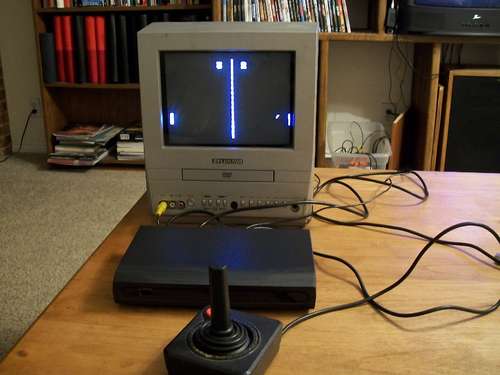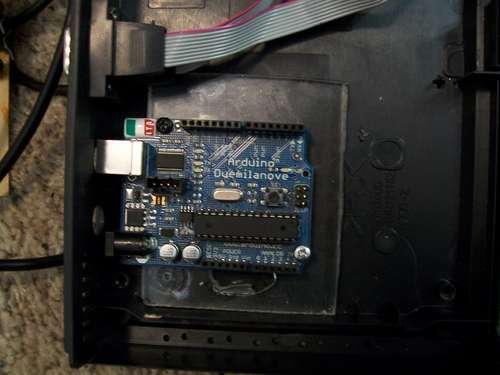Summary of Ardu-pong! the Arduino based pong console
This project describes creating a polished Arduino-based Pong console using an Atari joystick and custom enclosure. Unlike previous attempts using only potentiometers, this build focuses on user-friendly controls and compact design, culminating in fitting all components inside a small enclosure like a mint tin or a digital TV receiver case. Key steps include preparing the enclosure, installing an RCA jack for video output, wiring an RS232 serial port to connect the joystick to the Arduino, and integrating power control.
Parts used in the Arduino Pong Console:
- Arduino
- Atari joystick
- RS232 socket (serial port)
- RCA jack
- 1 KΩ resistor
- 330 Ω resistor
- Power switch
- Enclosure (e.g., busted digital TV receiver or mint tin)
 A while back the instructables robot made a post on Facebook about some guys who played pong on an Arduino (http://wayneandlayne.com/projects/video-game-shield/games/#pong)
A while back the instructables robot made a post on Facebook about some guys who played pong on an Arduino (http://wayneandlayne.com/projects/video-game-shield/games/#pong)but after looking around, i saw that everyone who did this was only worried about making it work. and often resulted as a very hard to use system with only potentiometers to use as controllers. so in my attempt at this, i decided that it needs to be much more polished if it is ever to be something of use. so heres how i did it:
UPDATE! ive managed to shink it down into an entire atari themed mint tin! check it out here
Step 1 Get the stuff.
first off, we obviously need an Arduino, we are also going to need an atari joystick, a rs232 socket, a rca jack, 1Kohm resistor and a 330 ohm resistor, a switch for power, and something to cram all the guts into , i decided to use a busted digital tv receiver as my enclosure
Step 2 Hack the enclosure.
 now take your chosen enclosure and take it apart and remove all the circuit boards and junk you otherwise will not need, then mount your Arduino against the backside of the enclosure and drill a hole large enough for a usb cable to fit through, then cut out a hole for the serial port to be mounted through.
now take your chosen enclosure and take it apart and remove all the circuit boards and junk you otherwise will not need, then mount your Arduino against the backside of the enclosure and drill a hole large enough for a usb cable to fit through, then cut out a hole for the serial port to be mounted through.Step 3 Install the rca jack.
then we can drill a hole in the back of the enclosure for the rca jack to come through and then glue it in place.
Step 4 Wire the serial port
now we have to wire the serial port to the pins on the arduino so we can get input from the joystick.
so using the following pinout, connect the following to the corresponding pins on the Arduino
pin1 up, to Arduino pin 7
pin2 dn, to Arduino pin 6
pin6 fire,to Arduino pin 2
For more Detail: Ardu-pong! the Arduino based pong consolebased
